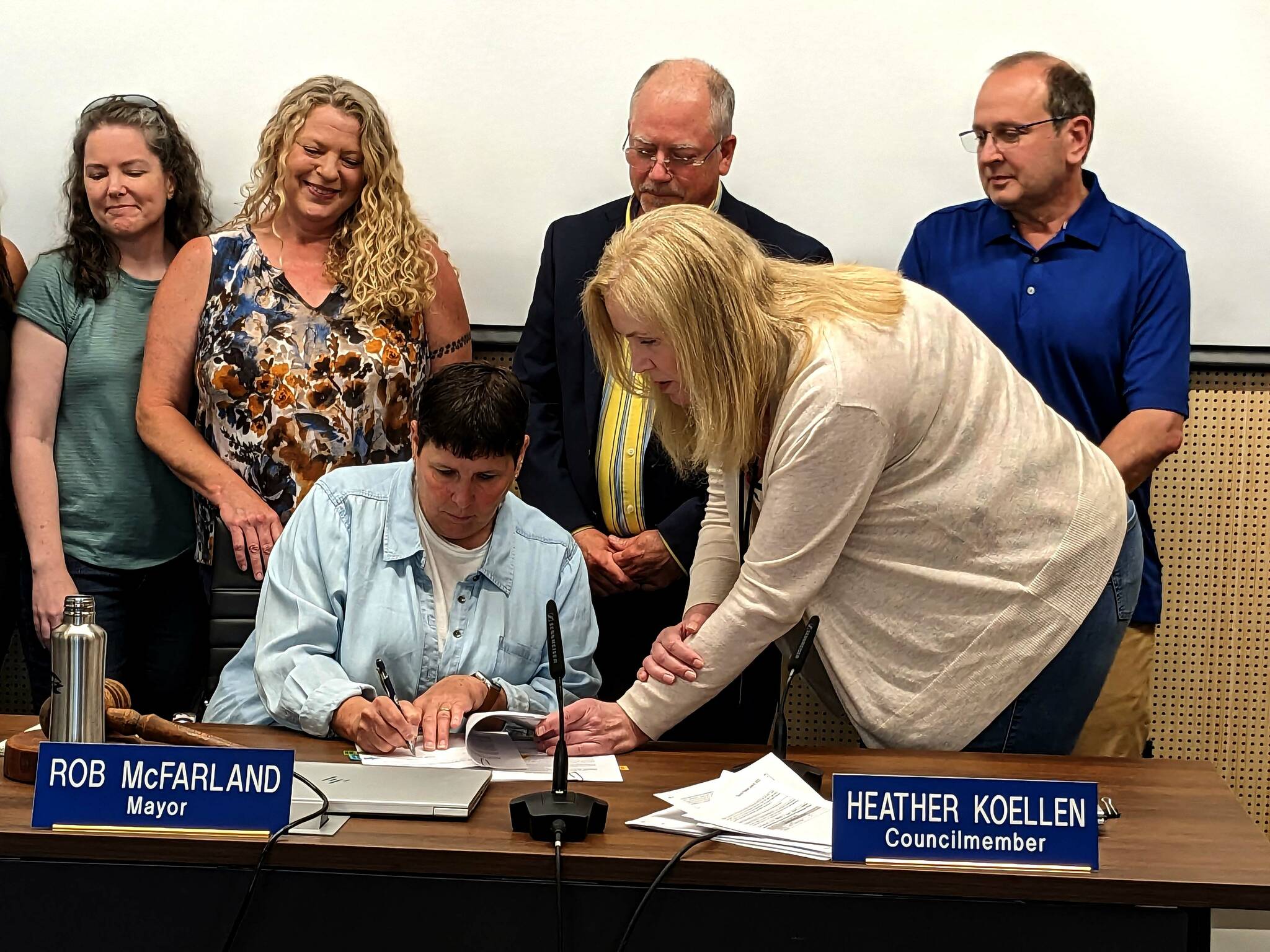After nearly two decades of negotiations, the North Bend City Council approved a water supply agreement with the Sallal Water Association on June 6, seemingly ending a tumultuous period that has long dominated city politics.
“This partnership between the Sallal Water Association and the City of North Bend ensures every property owner, every resident, every business, in our general service area has access to water,” North Bend Mayor Rob McFarland said.
As soon as McFarland proclaimed the agreement’s unanimous 7-0 approval, the crowd inside the city hall chamber stood to applaud, with some intermittently sharing high fives.
Sallal board members — who approved the same agreement by a 5-2 vote the day prior — then joined North Bend officials for photos and a celebratory signing of the contract that has long eluded them.
“We worked on this contract for almost 20 years,” said Ross Loudenback, a councilmember since 2006. “Tonight is a great night for the City of North Bend.”
Joyce Hibma, Sallal board treasurer and an agreement negotiator, said the partnership is the result of the right people coming together for honest and sometimes difficult conversations.
“Reconciliation and trust began to develop naturally as both parties worked together,” Hibma wrote in an email. “Once this contract received the blessing of the Sallal staff, city staff and engineers, I knew we had succeeded.”
The relationship between the city and Sallal has at times been thorny, with approval of the 40-year-long agreement following years of complex, on-and-off negotiations.
Under the deal, Sallal will give the city mitigation water, a requirement that puts them in compliance with their primary water rights permit. In return, Sallal will receive additional water to serve new connections. The infrastructure to facilitate that deal could be completed by 2025, according to the city.
Sallal and city officials are lauding the agreement as economically and environmentally responsible, saying it will allow for growth and economic development while also protecting the Snoqualmie River.
For Sallal, which is nearly at service capacity, there had been immense pressure to strike a deal and secure more water. The agreement helps avoid a costly service moratorium, or worse, said Daylin Baker, Sallal board vice president.
“We felt the pressure of our own impending moratorium which was likely only weeks away,” Baker wrote in an email. “[That] would have caused significant rate increases for all Sallal members, and potentially led to the end of Sallal.”
For the city, the deal brings them into compliance with their primary water right, the Centennial Well, which it received from the Department of Ecology back in 2009.
Ecology requires that North Bend compensate for the impacts of the Centennial Well — which is closely tied to the Snoqualmie River — by having two mitigation water sources on-hand to pump back into the river during low flow periods.
“This contract meets that criteria, and also satisfies a permit requirement to have a backup mitigation source,” said Mugdha Flores, a Department of Ecology spokesperson.
For years, North Bend has contracted with Seattle Public Utilities for access to one mitigation source, Hobo Springs, but had never narrowed down a second source. A Sallal-owned well near Rattlesnake Lake was seen as the most realistic option, but negotiations between the two parties never reached fruition.
But that changed in April, when the two sides unveiled the now-approved agreement. It came after Sallal had recently exited a six-month service moratorium to prevent overreach on its limited water supply.
Ken Hearing, a former mayor of North Bend who initiated the negotiations with Sallal in the early 2000s, said during public comment that he was glad to see a contract finally come to fruition and that Sallal’s membership supported it.
“I think it’s in the best interest of all of us,” he said.
Yet, while the city and most Sallal leaders have billed the agreement as a beneficial partnership, it has not gone without opposition.
Sallal officials were met with intense scrutiny leading up to the final vote on the agreement. They faced threats of violence and lies being spread about them online as well as pressure from a “local special interest group,” said Daylin Baker, Sallal board VP. Both Baker and Mayor McFarland have denounced opposition to the agreement as a veiled and misguided attempt to prevent growth in the city.
While not referenced by name, The Friends of the Snoqualmie River and Trail, a small grassroots group of Valley residents, has long opposed the water contract. They have argued an agreement will only harm the river.
Last month, Jean Buckner, president of the group, launched a Change.org petition asking for the removal of four of Sallal’s board members, including Baker, who voted in support of the agreement during an initial vote earlier this year.
The Friends group has previously filed a lawsuit against the city, targeting its water system plan, but it is unclear if they plan to attempt any legal action over the new agreement.
When reached by phone June 8, Buckner declined to comment on whether the Friends plan to pursue litigation, but said they had retained Patrick Williams, an environmental attorney. Williams is known for his successful argument before the state Supreme Court in Foster v. Yelm, Department of Ecology, a landmark case involving water rights and mitigation. A voicemail left for Williams was not returned.
In a follow up email, Buckner repeated the Friends’ criticisms of the agreement, saying it “does not contribute to the mitigation of the Snoqualmie River.”


